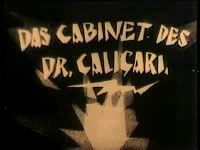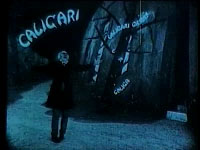| |

video - Courtesy of Cineteca di Bologna
Das Cabinet des Dr.Caligari (1919)
Film
by Robert Wiene
Decla Film - Berlin
Live computer soundtrack di Edison Studio - Rome
(2003)
Mauro Cardi, Luigi Ceccarelli, Fabio Cifariello
Ciardi, Alessandro Cipriani
percussions, samplers and live electronics
Edison Studio live electronics
produced by Edison Studio
with the contribute of 'Istituto Italiano di Cultura di Singapore', 'Goethe
Institut - Rom'
'Cineteca Nazionale di Bologna'
World
Premiere - ICMC 2003, Singapore Oct 2nd 2003
One of the true musical highlights of the conference was the world
premiere performance by the Edison Studio of a soundtrack to the German
horror film "Das Cabinet des Dr. Caligari" directed by Robert
Wiene. A visually stunning film with powerful expressionist imagery,
the music composed and performed by Luigi Ceccarelli, Fabio Cifariello
Ciardi, Alessandro Cipriani and Mauro Cardi provided a compelling
accompaniment to this silent classic.
Richly layered and aggressively beautiful, this is truly a marvelous
and masterly piece of work.
David
Kim-Boyle - Computer Music Journal
volume 28 number 2 Summer 2004 - MIT Press USA |

|
other performances:
Rome, Goethe-Institut Rom, dec 15, 2003
Malmoe, Sweden, "Eletrisk 04", may 8, 2004
Catania, oct 1st, 2004
|
 |
DAS
CABINET DES DR. CALIGARI
In the little village of Holstenwall on the Dutch border, fairground hypnotist
Dr.Caligari (Werner Krauss) puts on show a somnambulist called Cesare
(Conrad Veidt) who has been asleep for twenty-three years. At night, dressed
in a black body-stocking and with a ghostly white face, he slithers through
the town murdering people on the doctor's orders. A student (Friedrich
Feher) has his suspicions about Caligari after a friend is found dead
and it transpires that the doctor is the director of a lunatic asylum.
But the story also has a sting in the tail...
A masterpiece of the expressionist cinema, and the first cult movie in
the history of the cinema, The Cabinet of Dr. Caligari made use of the
most advanced artistic and literary experiences of the past century.
It denounces the suffering of the deceptively free human condition, always
on the edge between reality and fiction.
Wiene's film also appears to be filled with surprisingly historical premonitions.
After more than eighty years, the composition of the electronic soundtrack
by Edison Studio deeply re-designs the expressivity of the movie. A long
period of work was involved in analyzing the film and to redraw its interpretation.
During this phase, the composition's expressive elements were determined
as well as the formal path and the sound materials which make up the timbral
palette of the score. These include the vocal and instrumental samples,
the pre-existing musical fragments, and the concrete and synthetic sounds.
The instrumentation includes computers, MIDI keyboards connected to samplers,
percussion instruments and resonant sounding objects. The intervention
in real time, as in and beyond the tradition of silent films, helps recreate
the emotion. Through a live invention, not only musical but also one involving
the surrounding sounds and verbal language, these elements can then themselves
dissolve into the music. This makes it possible to develop connections
between the sound material and the expressive and symbolic world of the
characters and places of the movie, in a flexible and dynamic way.
The composition of this soundtrack was commisioned by International Computer
Music Conference (Singapore 2003).
|
| |
THE
LAST DAYS OF POMPEII
Film
by Eleuterio Ridolfi (1913)
Live Computer Soundtrack by Edison Studio (2002)

video - Courtesy of Cineteca del Friuli
Previous performances:
Milano, 16-11-2001, Palazzina Liberty, Festival "Senza parole"
(world première)
Roma, 9-12-2001, Goethe Institut, Edison Studio Incontri, Festival "Progetto
Musica"
Gothenburg, 18-09-2002, ICMC 2002 - selected in section "Videos for
Cinema Screening"
THE
LAST DAYS OF POMPEII
"The Last Days
Of Pompeii" (1913) is among the last of the great tableaux films.
In this rendition of Bulwer's classic novel, set in 79 A.D., the lives
of a prominent statesman, a beautiful woman, a pagan priest, a spiteful
witch and a blind beggar are carefully interwoven and brought to a climax
at the moment the sleeping volcano unleashes its fury.
Edison Studio (Mauro Cardi, Luigi Ceccarelli, Fabio Cifariello Ciardi
and Alessandro Cipriani) has composed a computer soundtrack on several
layers: symbolic sonic backgrounds and foregrounds, dialogs in "improbable"
languages,
(un)naturalistic references. In the spirit of silent movie tradition soundtrack
is performed live. The work has been selected for performance at ICMC2002
(Gothenburg, Sweden).
For information on
the American Tour 2003 a.cipriani@edisonstudio.it
>>>
HAVE A CLIP! <<<
|


